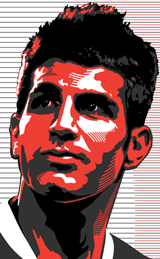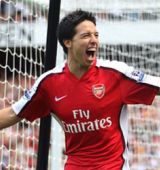Nasri, Flamini, & Misplaced Anger
776 comments August 3rd, 2011
The saga of Samir Nasri’s contract negotiations will be familiar to you by now.
Arsene had suggested they were close to an agreement in the Spring, before back-tracking and saying talks were on hold until the end of the season. Both Clichy and Nasri were given a deadline of the end of June to sign new deals, or face being sold off to the highest bidder.
Clichy decided his fate lay elsewhere, and left on good terms for pastures blue. It was an amicable parting of the ways, with Arsenal able to recoup a significant profit on a player who felt he needed a change of scenery.
It’s August now, and negotiations with Nasri’s representatives seem to have ceased entirely. The hopes of him extending his contract beyond next July have faded – he clearly sees his long-term future elsewhere. And yet he remains.
Arsenal now face the prospect of losing one of European football’s brightest talents, and one that cost us some £13m when he joined the club in 2008, for free. Understandably, this has provoked anger among fans. And part of that resentment comes from the fact that this is an all too familiar pattern.
The path from Marseille to Islington to the open plains of the Bosman has been trodden before, by one Mathieu Flamini. After a fairly middling career as a plucky and versatile squad member, including some impressive performances as a left-back in the run to the Champions League Final of 2006, the start of the 2007/08 season saw Flamini find himself in the first-team. An injury to Abou Diaby and the absence of Gilberto Silva opened the door, and Flamini kept it ajar with a series of all-action displays that endeared him to the Arsenal faithful.
Flamini was playing for his place. And, we were to discover, for his pay-packet. Despite Arsene’s confidence, a new deal never materialised, and Flamini found himself able to walk away and join his boyhood club, AC Milan. For nothing.
Flamini became the subject of much ire because, ultimately, Arsenal fans were disappointed that a solution to a problem area had emerged, only to disappear. Fabregas and Flamini was our most functional central midfield partnership since the days of Vieira and Gilberto – in fact, since Flamini’s departure Arsene hasn’t entrusted another pair to play in the middle of a midfield four. It was a duo that could have run and run – and boy could Flamini run.
Nasri’s career pattern at Arsenal has not been dissimilar. His most recent season has been by far his best, and that was reflected in the fact he finished second in the PFA Player of the Year Awards. He, like Flamini, emerged as a potential solution to a different problem: finding Cesc’s successor. Although he excelled in a wide role, Nasri has long envied Fabregas’ central playmaking position. The blow of the captain’s probably depature was due to be softened by the emergence of another world-class talent.
I don’t think either Arsene or the fans banked on Nasri declining the invitation to become Arsenal’s focal point. But Nasri has always been his own man, with little respect for reputations. He famously infuriated the old guard of the French national team by daring to sit in their seats on the coach. He is strikingly confident, and hugely ambitious, and seems to have decided that in order to fulfill those ambitions – namely by winning trophies – he needs to move elsewhere.
Naturally, this has drawn angry comparisons. According to some Arsenal fans, he’s “just another Flaminiâ€. Well, the situations have a fundamental difference.
With Flamini, the salt in the wound was that for the first time in his Arsenal career, he was worth something. Twelve months before he departed, Arsenal agreed a fee with Birmingham for a matter of a couple of million pounds. Had his contract not expired, the end of the 2007/08 season would have seen his worth quadruple – at least. The feeling was that Flamini had saved his best form for the season in which he was playing for a contract elsewhere. Arsenal benefited on the pitch, but lost out economically.
With Nasri it’s different. Having attracted interest from the likes of United and City, at various points this summer there have been offers on the table which would allow us not only to recoup our £13m investment, but almost double it. As goodplaya points out, the player himself is doing little wrong: he signed a four year contract, and is willing to see it through. He has not agitated for a move away – the decision to sell him or not rests with the club. And, crucially, the manager.
Having identified Nasri as Cesc’s heir apparent, the prospect of losing both has obviously come to Arsene as something of a shock. I don’t doubt that the club worked hard to offer Nasri an enticing new deal, but when he and his agent withdrew from talks in the spring Arsenal should have known what was coming. Now we’re in a position where we face the possibility of losing both players – a prospect that Arsene feels threatens our status as a “big clubâ€:
“I believe for us it is important the message we give out. For example, you talk about Fabregas leaving, Nasri leaving.
If you give that message out, you cannot pretend you are a big club, because a big club first of all holds onto its big players and gives a message out to all the other big clubs that they just cannot come in and take away from you.â€
It’s a strong statement, and one that puts the manager in something of a corner. For now, the seemingly imminent departure of Cesc means he’s prepared to take a £22m hit on Nasri, partially in the vain hope that Nasri will revel in the freedom afforded by a central role and sign a new deal.
I consider that unlikely. Big players want to play with other big players. Cesc leaving does not make Arsenal are a more enticing long-term option for Nasri.
I’m also not sure he’s right about how “big clubs†behave. Manchester United lost both Carlos Tevez and Cristiano Ronaldo in the same summer – I think it’s fair to say they’ve retained their status among the giants of the European game.
A big club is by definition bigger than any player. A big club would sell a player who didn’t want to be part of their long-term future and reinvest the cash in someone of equal talent. Alternatively, a big club would point to the end date on Cesc’s contract, tell Barcelona to try again next summer, and sell Nasri now in order to maximise revenue for the two players and put the club in the best possible position to adequately replace them.
Arsene, usually the economist, is justifying retaining Nasri as a “football decisionâ€. It’s an unfamiliar stance from our spendthrift manager. But, crucially, the fact it’s a football decision means it is his and his alone.
Nasri is not the appropriate target for anger. Unfortunately the world of football has moved on, and loyalty is not to be expected – certainly from a player who has already walked out on the club that raised him, Marseille. He’s a professional, doing a job. We can only hope he continues to do that job to the best of his abilities until Arsenal sell him, or his contract expires.
Man City will gladly come in with £20m+ plus and make Nasri a very rich man. They’re just waiting for Arsenal to give the word. But so far, the club remain resolute.
 Arsene is taking an enormous gamble. He’s hoping that Arsenal push on from last season, claim a trophy, and convince Nasri that his ambitions can be fulfilled in North London. As an eternal optimist, Wenger will have every faith that could happen.
Arsene is taking an enormous gamble. He’s hoping that Arsenal push on from last season, claim a trophy, and convince Nasri that his ambitions can be fulfilled in North London. As an eternal optimist, Wenger will have every faith that could happen.
Alternatively, his roll of the transfer dice could spectacularly backfire. If Arsenal fail to progress this season, and then Nasri walks away for nothing, the manager might find himself wondering if he should have taken the money and spent it on players who actually want to be here. And the board might find themselves wondering if they can still trust the judgement of the man once known universally as “The Professorâ€.
–
To subscribe to a daily email update from Gunnerblog, click here. Or to subscribe via RSS, simply click here. Thanks.







